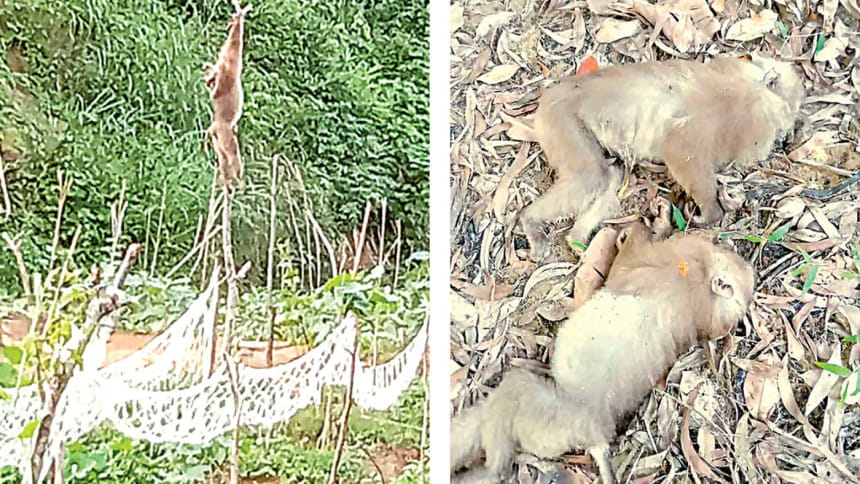Wildlife culling must stop

It is disturbing to learn of the reported killing of around 50 monkeys at Moheshkhali forest in Cox's Bazar last week, after they ate poisoned bananas placed as a trap by a local farmer. According to a report by this newspaper, officials from the Forest Department visited the site the morning after, and discovered the bodies of three monkeys. However, a local environmentalist claimed that they had counted close to 50 dead rhesus monkeys, most of whom had been buried by the time the officials got there. One of the monkeys was seen hanging from a tree, possibly as a warning to marauding simian gangs.
The question naturally arises: Why would anyone consider committing such a barbaric act? Unfortunately, this is neither an isolated incident, nor are monkeys the only animals to fall prey to wildlife culling in Bangladesh. In a country with fast-shrinking forest areas, animals are often killed for the benefit of human settlements and agricultural land near wildlife habitats, or for their market value. Sometimes they are killed in accidents as they cross roads slicing through forest areas. In fact, going by media reports, there is no shortage of reasons (or excuses) behind animals being killed. As a result, many species are now under significant risk of eradication.
For instance, according to the Forest Department, 90 elephants have been killed between 1995 and 2016 in and around the forest areas of Cox's Bazar and southern Chattogram. Monkeys, fishing cats, and badgers are also among the frequent victims of what is essentially a one-sided human-wildlife conflict. The response to these incidents remains equally troubling. Even though the Wildlife Conservation Act, 2012 dictates in clear terms the punishment for anyone who commits crimes against wildlife, the existing rate of trial and conviction of perpetrators leaves a lot to be desired.
The bigger problem, we think, is how we as a society approach the concept of human-wildlife coexistence. Wild animals are often killed by locals when they enter their farming land. Many claim that these killings happen because they can be a "nuisance" for farmers. The legitimacy of one's ownership of a piece of forest land is another matter, but there is no denying that wild animals have an equal stake in their habitats and way of life. Should we allow culling one species for the sake of another?
The ethical question of it aside, it is up to the Forest Department and other authorities concerned to find a balance for our own sake, which means raising awareness, strengthening monitoring, bringing perpetrators and encroachers of forestland to justice, and providing training to locals to adopt more peaceful methods to repel wildlife incursions. We urge the government to be more proactive in protecting our wildlife.

 For all latest news, follow The Daily Star's Google News channel.
For all latest news, follow The Daily Star's Google News channel. 



Comments